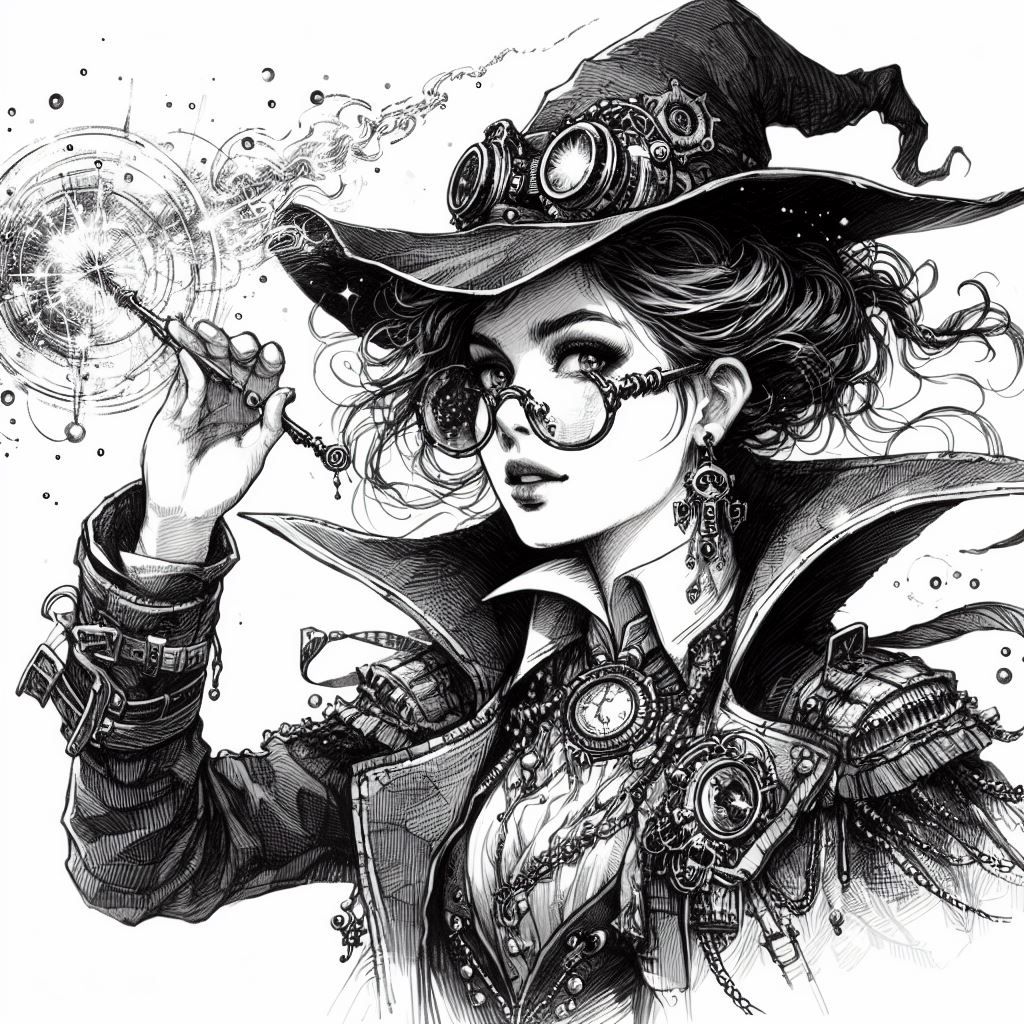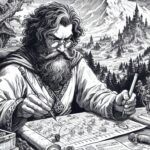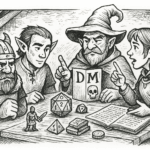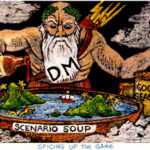
As a wizard, you can harness the power of magic through science and chemistry. You’ll learn intricate spells and formulas to manipulate and explore the world around you. But beware, mastering these powers takes many hours of study and preparation, which can take a toll on your physical health. Wizards are more like mad scientists than clerics, and their unique abilities can make them a valuable asset to any party.
Magic can take on many forms. Imagine creating lightning bolts from your fingertips or summoning a dragon to fight alongside you. The possibilities are endless with the power of magic. But be warned, using magic can also attract unwanted attention from dark forces who seek to control or destroy you. As a wizard, you must be prepared to face these challenges and use your knowledge and skills to protect yourself and your allies.
Ability Focus: Intelligence
Hit Points: d4
Ancestries Allowed: Human and Elf
Starting Reputation: -2
Restrictions: Magic users cannot use armor (or shields) and can only use weapons 2 lbs or lighter
Special: Familiar
At 4th level, the wizard attracts any one of the following creatures to serve as companions and helpers. Choose from any of the examples on the Pets page (subject to approval by your DM).
Spell Casting
See the Spell Casting page for details
Starting Spells
A wizard starts with 3 x Zero Level Spells and 2 x 1st Level spells of their choice in their Spell Book. Further spells can be added to their spell book via extended studies or scribing spells scrolls into their spell book (see below). A wizard can also use found or purchased spell books.
Starting Mana
A wizard starts with mana equal to their level, plus their intelligence bonus (including focus)
Read Magic Text
A wizard knows the shared language of magic and can both read and write it.
Creating Scrolls
For each scroll created, the wizard must collect 100 gp of supplies (special ink, paper, incense, etc.) and pass an Intelligence Check (DC 15 + level of the spell).
Casting limitations
Wizards cannot cast a spell for which they do not have the formula. This means that they must have the spell in their hand – either on a scroll or in their spell book at the time of casting.
If the spell formula is lost, then the intricate knowledge is also lost and spells cannot be cast anymore.
Learning New Spells
Wizards acquire spells in the form of scrolls they find when adventuring. Once they find a scroll, they must “scribe” it into their spell book to keep it. Once a spell is ascribed to the spell book, the character may use it as normal.
Scribing Spells
A wizard cannot access spells without copying them to their spell books. To do so, a wizard must have a scroll with the spell, and then pass an Intelligence Check (DC10 + the level of the spell). A failed roll means the spell cannot be deciphered, and the spell scroll becomes worthless to the wizard.
Starting Equipment
A backpack, a bedroll, a belt pouch, a flint and steel, ink, an inkwell, an iron pot, a mess kit, soap, a spell book, a spell component pouch, torches (10), trail rations (5 days), and a water skin.
Starting Money
All characters start with 2d4 x 10 gold pieces
Advancing your wizard
At Level 2 (2,000+ Experience Points)
Gain hit points by rolling 1d4 + Constitution and adding it to your total hit points
Gain access to Level 2 Spells
At Level 3 (4,000+ Experience Points)
Gain hit points by rolling 1d4 + Constitution and adding it to your total hit points
Gain access to Level 3 Spells
Increase Ability Focus to 2
At Level 4 (8,000+ Experience Points)
Gain hit points by rolling 1d4 + Constitution and adding it to your total hit points
Gain access to Level 4 Spells
Attract a Familiar companion / follower
Wizard Spell List
Zero Level Spells
1st Level
- Burning Hands
- Charm Person
- Color Spray
- Comprehend Languages
- Dancing Lights
- Enlarge
- Erase
- Feather Fall
- Floating Disk
- Hold Portal
- Identify
- Jump
- Light
- Magic Aura
- Magic Missile
- Mending, Improved
- Protection from Evil
- Shield
- Shocking Grasp
- Silent Image
- Sleep
- Unseen Servant
- Ventriloquism
2nd Level
- Clairvoyance
- Continual Light
- Darkness
- Detect Charm
- Detect Invisibility
- ESP
- Fool’s Gold
- Forget
- Invisibility
- Knock
- Levitate
- Locate Object
- Mage Armor
- Magic Mouth
- Mirror Image
- Pyrotechnics
- Ray of Enfeeblement
- Resist Fire
- Rope Trick
- Scare
- Shatter
- Spider Climb
- Spiritual Weapon
- Stinking Cloud
- Strength
- Web
- Wizard Lock
3rd Level
- Animate Dead
- Blink
- Clairaudience
- Dispel Magic
- Explosive Runes
- Fireball
- Flame Arrow
- Fly
- Gust of Wind
- Haste
- Infravision
- Lightning Bolt
- Monster Summoning I
- Phantasmal Force
- Protection from Normal Missiles
- Speak with Dead
- Suggestion
- Tiny Hut
- Tongues
- Water Breathing
4th Level
- Charm Monster
- Confusion
- Detect Lie
- Dimension Door
- Divination
- Enchanted Weapon
- Extension I
- Fear
- Fire Charm
- Fire Shield
- Fire Trap
- Ice Storm
- Minor Globe of Invulnerability
- Mnemonic Enhancement
- Monster Summoning II
- Polymorph Other
- Polymorph Self
- Raise Dead
- Sticks to Snakes
- Wall of Fire
- Wall of Ice
- Wizard eye
5th Level
- Cloudkill
- Conjure Elemental
- Feeblemind
- Hold Monster
- Magic Jar
- Passwall
- Quest
- Telekinesis
- Teleport
- True Seeing
- Wall of Force
- Wall of Stone
6th Level
- Death Spell
- Disintegrate
- Invisible Stalker
- Move Earth
- Project Image
- Reincarnate
- Stone to Flesh
- Stoneform
- Wall of Iron
- Weather control
7th Level
- Delayed blast fireball
- Force Cage
- Limited Wish
- Power Word Blind
- Prismatic Spray
- Reverse Gravity
- Spell Turning
- Statue
- Summon Object
- Teleport, Greater
8th Level
9th Level
This Post Has 10 Comments
Leave a Reply
You must be logged in to post a comment.






Do the armor and weapon restrictions apply just to Wizards, or to all magic users?
Restrictions are listed on classes and races. See their descriptions.
I know, sorry. I was wondering because the Restriction on the Wizard says:
“Magic users cannot use armor (or shields) and can only use weapons 2 lbs or lighter”
If that only applies to the Wizard, it should say “Wizards cannot use armor…” etc.
Each class has its own restrictions and benefits, but I see what you’re saying
spells known per level
0 1 2 3 4 5
1st 2 1
2nd 3 2
3rd 3 2 1
4th 4 3 2
5th 4 3 2 1
6th 5 4 3 2
7th 5 4 3 2 1
8th 6 5 4 3 2
9th 6 5 4 3 2 1
10th 7 6 5 4 3 2
There is no limit to spells. Spells are based on mana, level and the spells in the players spell book. There is no concept of memorization or forgetting like in other games. See: /spells/
How do Wizards and other magical users learn new spells?
Wizards acquire spells in the form of scrolls they find when adventuring. Once they find a scroll, they must “scribe” it into their spell book to keep it.
See: Using Magic
Are there specific times you can add a spell to your spell book? IE cost and time outside of a dungeon? Are there any penalties to failing? Just wondering if you had enough money you could keep trying to scribe the spell into your book, and just discard the used supplies if you fail, or can you only scribe a certain amount per level?
To do so requires a DC of 10 + spell level to scribe the spell to the spell book. The where and how is up to the DM. I like the idea of a failed scribe roll causing the spell to be non transferable to the spell book. Maybe the spell is too jumbled or missing something critical.